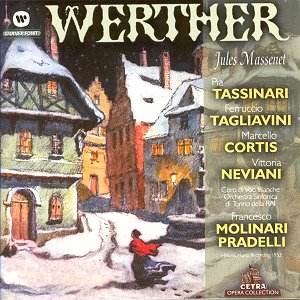Itís still just about seasonal to listen to Werther,
set as it is at Christmastide. This set is a reissue of those famous
Cetra LPs of the 1950s and very fine they were too. The choice is very
much a matter of forgetting about any sense of French style and making
do with voluptuous Italian singing, and itís certainly a fact that Tagliaviniís
French is a language almost of his own making. His mezzo voce
floats almost to falsetto but when fired up in this strenuous
role (such as in Act two, Scene three), the voice has ringing power.
Nevianiís French is even sketchier than Tagliaviniís but she trills,
twitters and glitters as Sophie, one of the most irritating characters
in all opera, always arriving at just the wrong moment. She is really
better suited to soap opera rather than the musical sort. As Albert,
Cortis puts as much passion as can be invested in such another one-dimensional
personality, and as Charlotte, Tassinari has an appealing, dark voice
(Ďil faut nous séparerí has genuine poignancy in Act one, Scene
ten) and she is the most Italianate of the cast, with the Letter Scene
full of passionate outbursts. Indeed she and Tagliavini underline the
Mediterranean quality of Massenetís music, which ignores the placing
of Goetheís novel in Frankfurt in 1780. With its Christmas setting there
are frequent moments when we could be in the Parisian second act of
La Boheme, but then Puccini wrote his opera only four years later.
The strength of Massenetís Werther lies above
all else in its beautiful melodic invention and wonderful orchestration;
indeed there are moments when one wants to listen to no more than the
instruments (especially the sensuously lush harp writing and the various
solo strings), which are very fine here under the experienced Molinari
Pradelli. Over the years there have been recordings with the likes of
Domingo, Gedda and (a rather ageing) Kraus in the title role partnered
by Obraztsova, De los Angeles and Troyanos respectively. This Cetra
set holds its own alongside such pairings, the finest Sophie, incidentally,
being the late and much lamented Arleen Augér on the DG set with
Domingo and Obraztsova.
The sleeve covers for these Cetra releases in LP format
were always highly distinctive, and they remain so in their current
reproduction as a cover of the CD booklet, though sadly this contains
neither biographical information about the singers nor background details
about the recording, other than to say that there are a few cuts in
this performance.
Christopher Fifield


